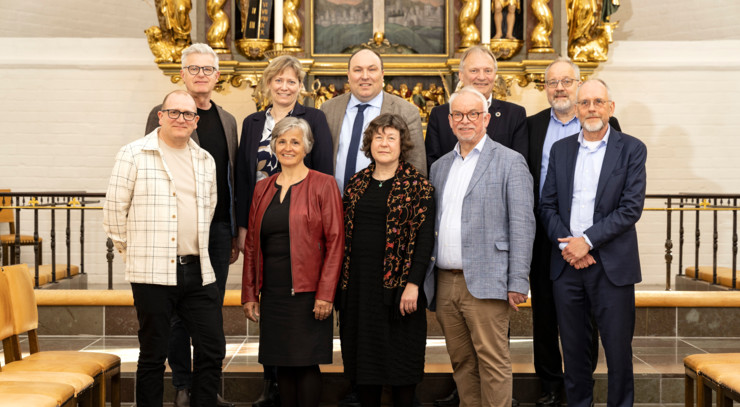Danish bishops warns against legalising euthanasia
Society should not be able to take the lives of citizens, states a joint statement from the Danish bishops

Joint photo of bishops April 2023 (Aalborg Cathedral Budolfi) Foto: folkekirken.dk/Claus Søndberg
JOINT STATEMENT FROM THE BISHOPS:
The issue of whether so-called euthanasia should be legalized in Denmark has been raised politically. In this regard, the bishops of the The Evangelical Lutheral Church in Denmark wish to express that, in line with the majority of the Danish Council on Ethics, we oppose such legalization.
In the Council of Ethics' statement of October 4, 2023, euthanasia, either in the form of mercy killing or assisted suicide, is defined as ”the act carried out at the explicit request of a person, with the intention of causing their death.”
We fear that legalizing euthanasia will influence the way we view other human beings and society in a such a way that it becomes more brutal.
There is a crucial difference between having a society that will assist people in despair and illness with comfort and support, doing what is possible to alleviate pain, and in contrast having a society that will assist desperate and suffering individuals in ending their lives.
In our view, the legalization of euthanasia will:
- Overstress individual autonomy and overlook the fact that humans are susceptible and dependant on relations with other humans.
- Be a step away from the appreciation and care for the individual's life, which has thus far characterized Danish legislation.
- Risk imposing social pressure on individuals, thinking they will be too much of a burden to others.
- Risk devaluing the worth of life for entire groups of physically or mentally suffering and care-requiring individuals.
- Impose the task of evaluating other people's lives and/or performing actions with the purpose of causing someone else's death.
- Give vulnerable and sick people the perception that they are burdens on their relationships and society.
It is our presumption and fear that the apparent positive sentiment among citizens (jf. Megafon's survey for TV2, July 2023) partly stems from confusion about concepts and perhaps also about the current legal status.
The fear of unbearable pain or of a hopeless prolongation of life can lead to an expression of a desire to legalize euthanasia, even though there already exists legislation that addresses this fear.
Therefore, Section 25 of the Health Act, which allows for pain relief even if it accelerates the time of death, and the withholding of life-prolonging treatment, can be made more known to the public. Similarly to the Council on Ethics' statement, we believe that palliative care should be society's response to the anxiety and suffering that are associated with the dying process for some individuals.
It is a religious and existential realization that life is a gift given in the context of and obligation to others, and impermanence is a condition. Throughout life, we suffer under the condition that we deteriorate and must die. Making life and death the individual's own choice is an overextension of human free will: Firstly, a person cannot decide to come to life; they can only decide to die. Secondly, it is difficult to confirm when a decision not to want to exist any longer is made on a completely free basis. If society were to fully embrace the consequences of asserting human free choice regarding their own death, it would, in principle, no longer make sense to work to save those contemplating suicide.
However, from a Christian basis of faith, the weak and powerless life is a dignified life. Any division of life and death into worthy and unworthy tends to equate dignity with strength and self-determination, and unworthiness with weakness, dependence, and pain. In this way, the individual in need of help, care, and nursing is subjected to the designation of unworthy. This type of shift in values increases the fear in the individual of being a burden on society and other people.
In the implementation of legal euthanasia, despite all intentions to follow the interests and wishes of the individual, it will be impossible to absolve society of complicity and suspicion of economic or resource-based interest in contributing to the deaths of weak and care-requiring citizens.
Therefore, the bishops collectively express that society should not be able to take the lives of its citizens.
Passed at the Bishop's meeting on October 27, 2023.


